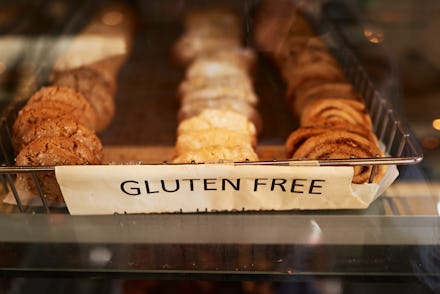Science Shows Gluten-Free Food Isn't Actually Any Healthier for Most of Us

Bread-eaters, beer drinkers and seitan enthusiasts alike now have something to rub in the noses of their gluten-free comrades: There's yet more scientific evidence that a gluten-free diet may do little for one's health.
A recent George Institute for Global Health scientists study has found no evidence that the nutritional value of gluten-free food differs significantly from baseline food products, except they offer less dietary protein.
While those with celiac disease are certainly in their own category, the study found those otherwise eating gluten-free food for their "health benefits" may be grasping at straws.
The science: The research team, whose findings were published in the British Journal of Nutrition, compared over 3,200 foods in a variety of categories, including both staples of a healthy diet and junk food like potato chips. The results revealed gluten-free foods contained less protein, but were otherwise mostly identical in levels of sodium, sugar and other nutrients.
"Gluten-free foods are essential for patients who suffer from coeliac disease," Jason Wu, the study's lead author, told Mic via email. But, as almost anything labeled "gluten-free" becomes increasingly popular on grocery store shelves, Wu said these products are becoming more of a staple for people who do not necessarily need them but simply associate "products that are gluten-free as being healthier."
However, when these products are actually examined through a careful scientific lens, any such claims of elevated health properties mostly go out the window.
"We found that many products are now labelled as gluten-free, even amongst junk foods that are typically high in sugar, salt and saturated fat," Wu told Mic. "Our results indicate that there is in fact little difference in the overall nutrition profile between gluten-free and non-gluten-free products across both core foods (e.g. bread and pasta), or junk foods (e.g. processed meats and cakes)."
Debunking gluten-free food: Claims gluten-free food is healthier have doubtless fueled skyrocketing sales of gluten-free food, which research group Mintel says rose 63% from 2012 to 2014 to $8.8 billion.
Avoiding gluten is very important for the relatively small but growing proportion of the population with celiac disease, which causes gluten to damage the intestines.
However, some gluten-free advocates go further, claiming gluten is responsible for inflammation in the dietary tract in gluten "intolerant" individuals who do not have celiac disease, as well as say gluten-free diet has beneficial impacts on gut flora. Some doctors believe increased consumption of synthetic and processed foods has led to increased gluten sensitivity.
But David S. Seres, director of medical nutrition and associate professor of medicine at Columbia University Medical Center's Institute of Human Nutrition, said these claims lack scientific validity.
"Just like a vitamin making non-claims such as 'supports heart health,' people have it in their heads that gluten-free food will improve gut health," Seres told Mic via email. "I think the food industry is simply riding the tide of hype and frenzy."
Research from Peter Gibson at Monash University in Melbourne has suggested a specific group of dietary sugars known as FODMAPS typically found in higher quantities in gluten-containing foods is the most likely culprit of many supposed cases of gluten intolerance.
The bottom line: Simply put, there is "no evidence that a gluten-free diet is best for the general health-conscious public," Seres told Mic, except for those individuals who have been diagnosed with celiac disease by a doctor or who otherwise have a "strong reason" to suspect their symptoms are directly tied to gluten consumption.
"There are numerous people with non-specific GI symptoms who claim to feel better on the diet. For these, there are possibly people with celiac disease but with negative tests," he said. "But for most others, it is as likely to be a placebo effect as not."
So if you really think gluten is behind your digestive woes, get a formal medical diagnosis. Otherwise, if the food itself isn't even any healthier, then it probably isn't worth shelling out extra for it.
July 8, 2015, 8:54 a.m.: This article has been updated.